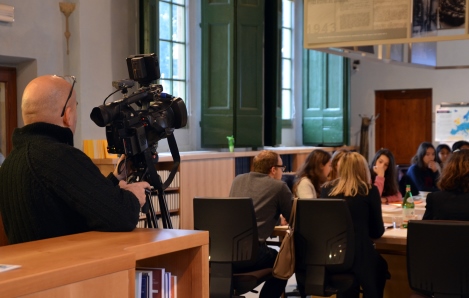Posted on 15 February 2016
 Former Member of the European Parliament Monica Baldi visited the Historical Archives of the European Union to participate at the Archives’ educational programme for Florentine secondary schools. During her encounter with the students, MEP Baldi presided over a session of a mock Committee on Civil Liberties, Justice and Home Affairs (LIBE) of the European Parliament and had students debating on the controversial issue of the closure of national frontiers and the future of the Schengen Treaty.
Former Member of the European Parliament Monica Baldi visited the Historical Archives of the European Union to participate at the Archives’ educational programme for Florentine secondary schools. During her encounter with the students, MEP Baldi presided over a session of a mock Committee on Civil Liberties, Justice and Home Affairs (LIBE) of the European Parliament and had students debating on the controversial issue of the closure of national frontiers and the future of the Schengen Treaty.
The programme “Florentines: Citizens of Europe” aims at introducing school students to the history, objectives and democratic basis of the European Union, to its governing institutions and to its archival legacy at the European University Institute in Florence.
In two sessions, one in school and one at Villa Salviati, the students are introduced to the history of the European Union and to its Institutions, from the first steps of a united Europe as a project and the views of the founding fathers, to the latest enlargement of the European Union and the Treaty of Lisbon. Through a series of presentations, quizzes and interactive games, the students are presented with images and documents available at the Historical Archives, with which they learn about the different tasks performed by each of the institutions and how they have evolved over last 70 years.
The second session at Villa Salviati consists of a presentation on the origins and history of the Historical Archives of the European Union, what an archive is and what archivists do. The students learn about the different types of archives held at the HAEU and the research work and initiatives of the Archives. This is followed by a session on deliberative democracy where the students take part in a mock parliamentary debate. The students take on the role of Members of a European Parliament and hold a debate on a controversial political issue, in 2016 “the temporary suspension of the Schengen Treaty in the European Union and consequent restoration of border controls at the national frontiers”.
The session starts with the presentation of a mock resolution of the European Commission to suspend the Schengen Treaty. Then students split up into political groups (Radicals, Progressives, Nationalists and Conservatives) and discuss the arguments. A representative of the group will then report in a plenary session, which is followed by a plenary discussion and a final vote on the resolution.